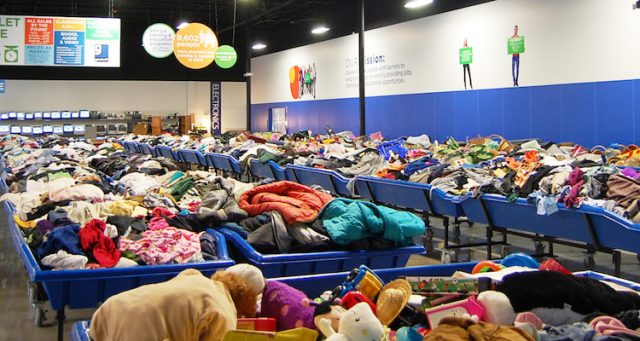
It had always been my assumption that the clothes you buy at Goodwill have been laundered between the time they were donated and the time they were put on the racks. They couldn’t just sell people’s dirty clothes, could they? That’s gross. We are not savages.
Upon reflection, it seems my main reason for this assumption was that I’d once heard a comedian say that instead of paying ten bucks to have his suit dry-cleaned, he’d donate it to Goodwill, let them clean it, then buy it back for five bucks. I didn’t think the comedian had actually done this, but the idea seemed logically sound. If Goodwill doesn’t wash the clothes, the plan crumbles.
Then one evening I was with some friends, receiving many compliments from them on the stylish and attractive new pants I was wearing, which I’d bought at Goodwill. I said, “Oh, thanks! Aren’t they nice? I got them at this trendy little boutique called Goodwill.” (That’s a small joke, you see. I often use humor in my interactions with friends.) The conversation turned to how you can frequently find some very nice things at Goodwill, which is what people always say when the subject of thrift stores comes up, as a means of reassuring you that there is NO SHAME WHATSOEVER in buying things that other people were going to throw away. Then it came to light that I had bought these pants earlier that very day, and suddenly there was controversy.
“Wait,” someone said. “You haven’t washed them yet?”
“Isn’t that kind of gross?” someone else said.
I said, “I’m pretty sure Goodwill washes everything before they sell it. They have fitting rooms so you can try stuff on before you’ve even bought it. There must be health code regulations or something.” A few people in the group agreed with my way of thinking, and we were now split between two possibilities:
1. Goodwill washes donated clothing prior to selling it.
2. Goodwill does not wash donated clothing prior to selling it, so anything you buy, try on, or even touch may well be contaminated with whatever diseases and insects plagued the former owner.
The second option was too horrible to contemplate. I’d been wearing these pants all day. It was like learning the cheeseburger you’d already eaten half of was made out of babies. “This cheeseburger can’t be made out of babies!” you’d tell yourself. “I’ve already eaten half of it!”
Goodwill’s website is cagey on this subject. (The subject of washing clothes, not cheeseburger babies.) Under the “dos” and “don’ts” of donating, they say you should wash or dry-clean clothing, and they say not to donate soiled items. But those are just suggestions, and people tend to ignore suggestions when it comes to donating things, because they think, “HEY, I AM BEING CHARITABLE, BEGGARS CAN’T BE CHOOSERS, I AM AWESOME JUST FOR GIVING YOU THINGS!” Most Goodwill stores have fitting rooms, which suggests that they’re encouraging you to try things on before you buy them, which means they can’t be TOO disease-ridden. On the other hand, the Goodwill website makes no mention of fitting rooms, and indeed reports that “some shoppers like to bring in a seamstress’ tape measure” to ensure that the items they’re buying will fit, which sounds like they’re gently suggesting that you NOT try them on.
The next time I was at Goodwill, I asked a cashier about it. I said, “When people donate clothes, do you guys wash them before you sell them?”
The cashier replied, “Oh, heavens, no.”
So there you go.
Still, I figure people aren’t generally donating their dirty laundry. It’s not like you go for a jog and throw your sweaty T-shirt in the Goodwill bin on your way home. Usually you’re giving away clothes that were washed long ago and have been sitting unworn in a closet or drawer while you became too fat to wear them. YOU might need a good cleaning, but the clothes are probably all right.
There remains the possibility that when the police find a cache of dead hobos under a bridge, they take the clothes off the corpses and deliver them to Goodwill, but that probably is not common.
I am far less optimistic about the state of things at the Goodwill Outlet stores. Did you know that Goodwill has outlet stores? They do. This is where things that have failed to sell at regular Goodwills are given one last chance before they are thrown away. Whatever doesn’t sell at the Goodwill Outlet is literally taken directly to a landfill. Please reflect on that. Goodwill already sells people’s trash. The Goodwill Outlet stores sell Goodwill’s trash. It’s the trash’s trash. It’s grandtrash. If you buy something at a Goodwill Outlet and then throw it away again, it becomes great-grandtrash.
The nearest Goodwill Outlet to me is way down at the south end of Portland, where we keep most of our skanky things. I’d heard stories about it and recently went to check it out for myself. It’s a large, nondescript warehouse, like a Costco but without the charm. I assume it’s fairly representative of Goodwill Outlets in general, but to confirm this I would need to visit other Goodwill Outlets, and this is not something that is going to happen within the span of my natural life.
People call the Goodwill Outlet “The Bins,” because instead of being hung on racks or placed on shelves, everything is tossed into bins. The clothing bins are separate from the shoe bins, which are separate from the book bins and the glassware bins and the miscellaneous crap bins, but other than that no attempt is made to differentiate. Clothes are sold by the pound. I’m not kidding. You want a pound of shirts? That’ll be $1.89.
There’s no reason the stuff at the Goodwill Outlet would be any filthier than the stuff at a regular Goodwill, since everything came from there to begin with. But it seems dirtier. At a regular Goodwill, with everything neatly separated according to size and style, it’s easy to pretend that you’re not picking through things that other people threw away. That illusion is ruined at the Goodwill Outlet, with its gray, Soviet-style lighting and piles of merchandise. Merchandise should not come in “piles.” The “pile” is entirely the wrong format for merchandise.
The Bins would be an excellent place to go if you were thinking of becoming a hoarder. It’s a hoarding starter kit. Perhaps it violates the spirit of hoarding to accumulate all your garbage all at once rather than over a period of years, but there’s no denying it’s economical and efficient. If for some reason you needed to be a hoarder by this weekend and hadn’t even started yet, the Goodwill Outlet would be a lifesaver.
The people who frequent The Bins are an interesting mix. I only saw a few who seemed to be there out of necessity, who were so impoverished they could not afford to shop at a regular Goodwill. (“The fancy Goodwill? Who am I, Rockefeller?!”) Mostly there were two groups: the funky do-it-yourselfers who like to buy old trinkets and knick-knacks to make their homes more “eclectic” (read: filled with junk); and the people searching for valuable treasures. If you know what you’re looking for, you can find vintage clothing or rare books that you can sell for a lot of money on eBay, and all you have to do to get them is rummage around in bins full of garbage, like a common raccoon.
You can spot the people who are very serious about their Goodwill Outlet treasure-seeking because they wear plastic gloves as they root through the piles, lest they lose a finger on a saw blade or contract hepatitis from a disreputable negligee. Goodwill actually has signs posted urging browsers to be cautious, as there is no way of knowing where something sharp or contagious might be lurking. As a general rule, one should avoid any kind of retail experience that requires protective gear. One might wear the unlaundered cast-off clothing of strangers, but one must draw the line somewhere.



